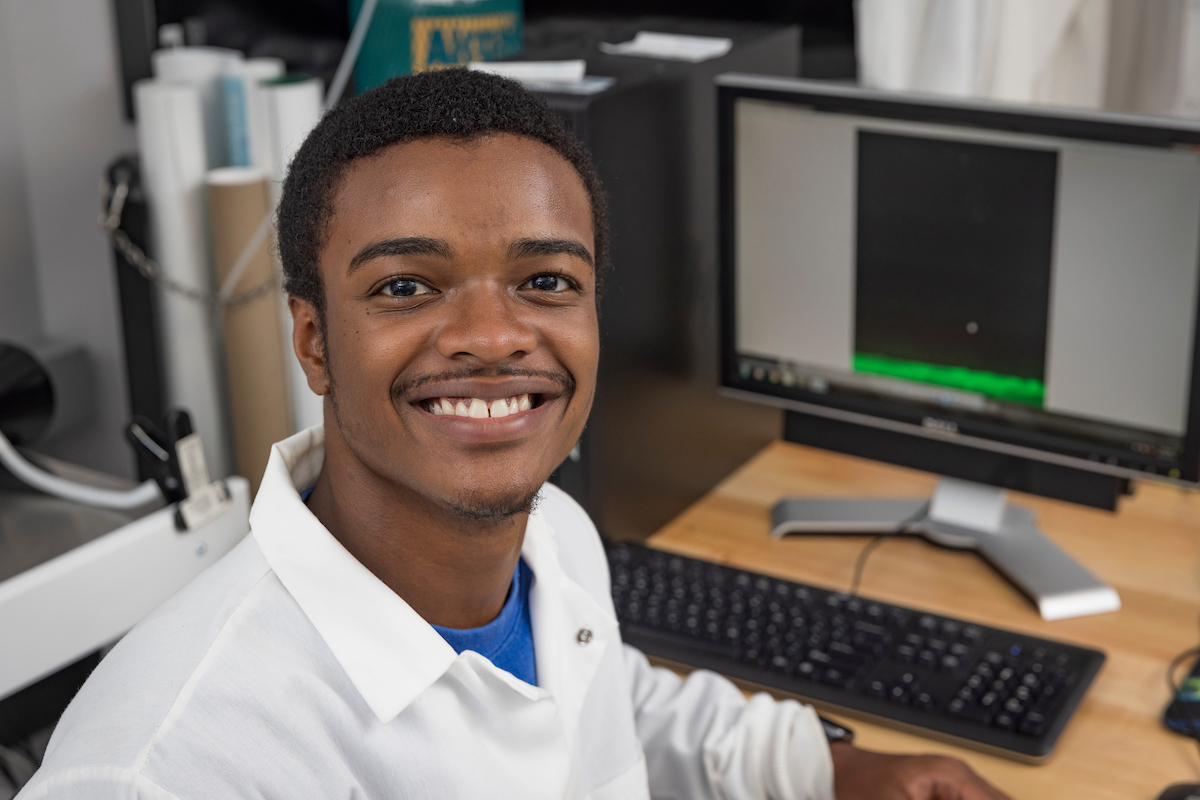Biomedical Engineering Department celebrates fall 2022 successes

The fall semester at Binghamton University is underway, and the students, faculty and staff from the Department of Biomedical Engineering at the Thomas J. Watson College of Engineering have been busy with classes, research projects and more.
Research news
A new agreement between Upstate Medical University and Watson College will strengthen ties between the two schools and encourage closer research collaborations in biomedical translational science research. Areas being explored include neuroscience, brain imaging, digital pathology, cancer research and bone-tissue engineering.
In a paper published in Nature Communications, Matthew Brown, PhD ’22, and Assistant Professor Ahyeon Koh show how a gold CD’s thin metallic layer can be separated from the rigid plastic and fashioned into sensors to monitor electrical activity in human hearts and muscles as well as lactose, glucose, pH and oxygen levels. The sensors can communicate with a smartphone via Bluetooth.
Brown and Koh also collaborated on “smart” bandage research published in ACS Sensors. They propose an adhesive-free, stretchable and permeable wound-care platform that would feature multiple sensors to offer real-time data about exudate (the medical term for wound discharge). A heating element also would keep wounds at an optimum temperature.
Assistant Professor Yuan Wan wants to develop a faster, less painful way to diagnose malignant solitary pulmonary nodules, which affect more than 1.5 million Americans each year. He has received a five-year, $2.4 million grant from the National Institutes of Health through the prestigious MERIT (Method to Extend Research in Time) Award program.
Assistant Professor Yizeng Li, who joined the BME faculty this fall, co-authored a paper in Nature Communications about cell locomotion, offering a few more steps along the path to future cancer treatment. Collaborators included researchers from Johns Hopkins University, the University of Maryland, the University of Alberta and the Universitat Pompeu Fabra in Spain.
Student news
Clara Rodriguez, a biomedical engineering major and Spanish minor, is part of the Beckman Scholars Program, a 15-month mentored research experience for undergraduate students in chemistry, biological sciences, biochemistry, biomedical engineering or integrative neuroscience. She is working with Associate Professor Guy German to analyze skin patterns on human hands and arms for potential forensic applications.
Biomedical engineering major/biology minor Ryan Soron spent his summer in the lab as part of the Masonic Medical Research Institute’s Summer Fellowship Program in Utica. During the 10-week fellowship, undergraduate, graduate and medical students are immersed in cutting-edge science, technology, engineering and math (STEM) research. They are paired with a principal scientist at the institute, and work together to design a project that complements both the interests of the student and the laboratory.
An American Heart Association (AHA) fellowship will allow graduate student Natalie Weiss to further her research in developing 3D heart models. She conducts her work in Assistant Professor Tracy Hookway’s lab, using cell culture, 3D modeling of stem cells and live imaging of tissue for regenerative medicine therapy.
A feature in the Watson Review looking at the best senior capstone projects for 2021-22 discussed the BME team tasked with developing a bladder sensor that can seamlessly send results via Bluetooth to a mobile device.
Alumni news
In the weeks before earning his bachelor’s degree, Flynn Anderson ’22 collected the Chancellor’s Award for Student Excellence, the President’s Award for Undergraduate Student Excellence and the Student of Distinction Award. He also traveled to Puerto Rico to the Inclusiv Annual Conference to represent Binghamton’s diversity, equity and inclusion initiatives.
In an article in Issues in Science and Technology. alumnus Guru Madhavan, MBA ’07, PhD ’09, senior director of programs at the National Academy of Engineering, proposes the concept of “grind challenges” that may provide a different conception and articulation of engineering and major projects.
In addition to majoring in biomedical engineering with a dual concentration in biomaterials and computational bio-systems, Vanessa Serna Villa ’22 loved to stay busy. From being the vice president of the Society of Women Engineers to picking up dancing as a hobby as a first-year student, she seems to do it all. She is currently attending Carnegie Mellon University for a master’s degree with full funding from the National Consortium for Graduate Degrees for Minorities in Engineering and Science (GEM) Fellowship.
